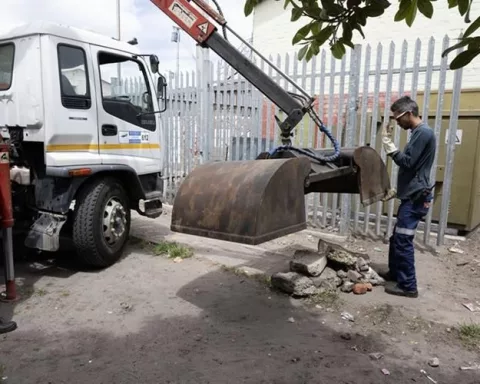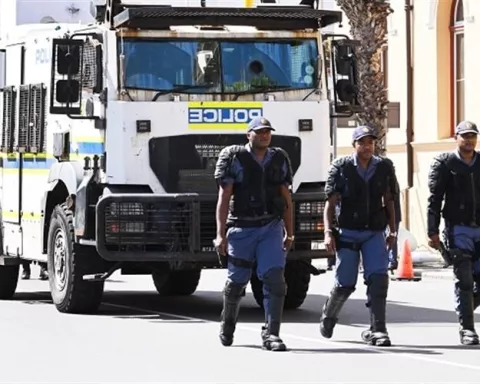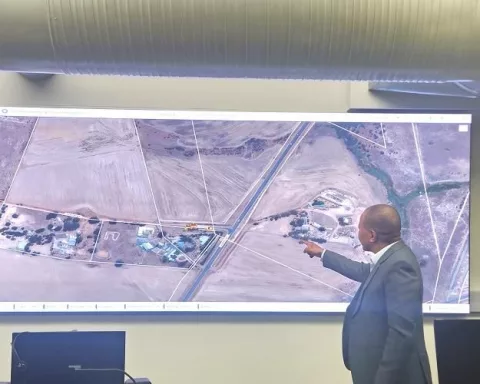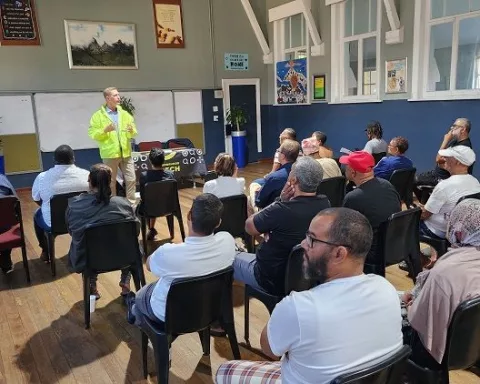Deputy Minister Polly Boshielo dreams of a safer South Africa where everyone can live without fear. She shared her vision in a powerful speech, calling for teamwork among communities, local governments, and police to tackle crime head-on. With initiatives like Operation Shanela, which has already led to thousands of arrests, and a strong focus on stopping illegal mining and gender-based violence, Boshielo emphasizes that safety is a shared responsibility. By working together, South Africans can build a brighter, safer future for all.
What is Deputy Minister Polly Boshielo’s vision for a safer South Africa?
Deputy Minister Polly Boshielo envisions a safer South Africa through comprehensive crime-fighting initiatives, community engagement, and collaboration with local governments. Key strategies include Operation Shanela, combating illegal mining, and addressing Gender-Based Violence, emphasizing collective responsibility for national safety and security.
Addressing the Nation: A Call to Action
On February 12, 2025, in the esteemed chambers of the South African National Assembly, Deputy Minister of Police Polly Boshielo delivered a stirring address on the critical issues of crime and corruption. Her speech resonated as a call to arms for a nation eager for change and security. With conviction, she articulated not only the government’s determination but also the historical and future aspirations of the country.
Central to her address was the National Development Plan Vision 2030, a strategic framework aspiring to transform safety and security from mere hopes into tangible realities. Boshielo’s message echoed the enduring promises of the 1955 Freedom Charter, pledging a future where all citizens could live without fear. Her focus on immediate and decisive action mirrored the urgent demand from society for safer communities and a commitment to upholding the values of justice and security.
Government Initiatives Against Crime
Minister Boshielo highlighted the government’s robust initiatives to combat crime, with Operation Shanela at the forefront. This key initiative by the South African Police Service (SAPS) showcases a comprehensive strategy to curb criminal activities. Through a combination of tracking operations, roadblocks, high-visibility patrols, and stop-and-search tactics, Operation Shanela has become a formidable force in crime prevention. During just one week in February 2025, the operation resulted in the arrest of 2,777 suspects, demonstrating its significant impact and effectiveness.
The Deputy Minister also drew attention to the fight against illegal mining through the Vala imiGodi initiative. By seizing millions in cash and confiscating illegal minerals, the program underscores a firm stance against the economic harm inflicted by illegal mining operations. These efforts are part of a larger strategy to protect the nation from economic threats and ensure the integrity of South Africa’s resources.
Boshielo further addressed the critical importance of securing the nation’s borders, which plays a vital role in maintaining national safety. Through over 611,910 security actions, authorities apprehended 6,713 individuals for crimes ranging from illegal immigration to drug trafficking. This aspect of her speech highlighted a coordinated and strategic approach to border security, essential for preserving the country’s sovereignty and internal peace.
Tackling Organized Crime and Corruption
The Deputy Minister dedicated a significant portion of her speech to the growing concerns of extortion and crimes in the construction industry. By working closely with the National Prosecuting Authority (NPA) and other agencies, the government is dismantling criminal syndicates that have plagued the sector. Success stories from regions like Lusikisiki and the OR Tambo District illustrate the positive outcomes of these collaborative efforts.
Boshielo also spotlighted the Directorate for Priority Crime Investigation, known as The Hawks, and their multi-agency task team approach. This method has led to numerous arrests for serious organized and commercial crimes, underscoring the government’s relentless pursuit of justice. Her discourse conveyed a strong commitment to eradicating corruption and ensuring accountability, regardless of the offenders’ backgrounds.
In her vision for urban safety, Minister Boshielo introduced the innovative Safer Cities Cooperation Agreements. These agreements foster a unified response to crime in major cities by partnering with local governments, Metro Police, and provincial authorities. This holistic approach to urban safety reflects a strategic shift towards collective security, integrating various law enforcement bodies into a cohesive unit.
Community Engagement and Social Issues
Boshielo’s address emphasized the importance of community involvement in policing efforts. She highlighted the role of Community Policing Forums (CPFs) supported by government funding, which aim to bridge the gap between law enforcement and citizens. With over 26,000 community members serving as patrollers, this grassroots model of policing enhances trust and security within neighborhoods.
The Deputy Minister did not shy away from addressing the grave issue of Gender-Based Violence (GBV) and Femicide. The establishment of dedicated GBV desks and victim-friendly facilities at police stations demonstrates a comprehensive and compassionate approach to these crimes. Ongoing training for detectives to handle such cases with professionalism and empathy underscores a deep-seated commitment to protecting vulnerable populations.
Minister Boshielo concluded her address by acknowledging the sacrifices made by police officers in the line of duty. Her poignant reflection on the loss of officers since October 2024 served as a somber reminder of the human cost involved in the fight against crime. This narrative thread paid tribute to those who risk their lives to defend the nation, highlighting the personal stakes in the collective endeavor for safety.
Renewing the Nation’s Commitment to Safety
In closing, Deputy Minister Boshielo reaffirmed the ideals of the Freedom Charter, a document encapsulating the aspirations of a nation striving for peace and security. Her call to action emphasized that combating crime and corruption extends beyond governmental responsibilities; it is a collective mission requiring the dedication of every South African. With unity and resolve, South Africa can become a bastion of safety and security for all its citizens, fulfilling the promises of its enduring democratic principles.
FAQ – Deputy Minister Polly Boshielo’s Vision for a Safer South Africa
What is Deputy Minister Polly Boshielo’s vision for a safer South Africa?
Deputy Minister Polly Boshielo envisions a safer South Africa through comprehensive crime-fighting initiatives, community engagement, and collaboration with local governments. Key strategies include Operation Shanela, combating illegal mining, and addressing gender-based violence, emphasizing collective responsibility for national safety and security.
What initiatives are being implemented to combat crime in South Africa?
The government has launched several initiatives, with Operation Shanela at the forefront. This initiative includes tracking operations, roadblocks, high-visibility patrols, and stop-and-search tactics. It has already led to the arrest of thousands of suspects. Additionally, efforts against illegal mining and initiatives aimed at tackling gender-based violence further demonstrate the government’s multi-faceted approach to crime prevention.
How is the government addressing issues related to illegal mining?
The government is tackling illegal mining through initiatives like Vala imiGodi, which focuses on seizing assets from illegal operations and confiscating illegal minerals. This program aims to mitigate the economic harm caused by illegal mining and protect South Africa’s natural resources.
What role do communities play in crime prevention according to Deputy Minister Boshielo?
Deputy Minister Boshielo emphasizes the importance of community involvement in policing efforts. Community Policing Forums (CPFs) are supported by government funding and aim to bridge the gap between law enforcement and citizens. With over 26,000 community members serving as patrollers, this grassroots model enhances trust and security within neighborhoods.
How is the government addressing gender-based violence in South Africa?
To combat gender-based violence (GBV), the government has established dedicated GBV desks and victim-friendly facilities at police stations. Additionally, ongoing training for detectives focuses on handling GBV cases with professionalism and empathy, ensuring a compassionate approach to protecting vulnerable populations.
What is the significance of the Freedom Charter in Deputy Minister Boshielo’s address?
The Freedom Charter serves as a historic document encapsulating the aspirations of a nation striving for peace and security. In her address, Deputy Minister Boshielo reaffirmed its ideals, emphasizing that combating crime and corruption requires a collective mission. She called for unity and commitment from all South Africans to make the country a safer place for everyone.












